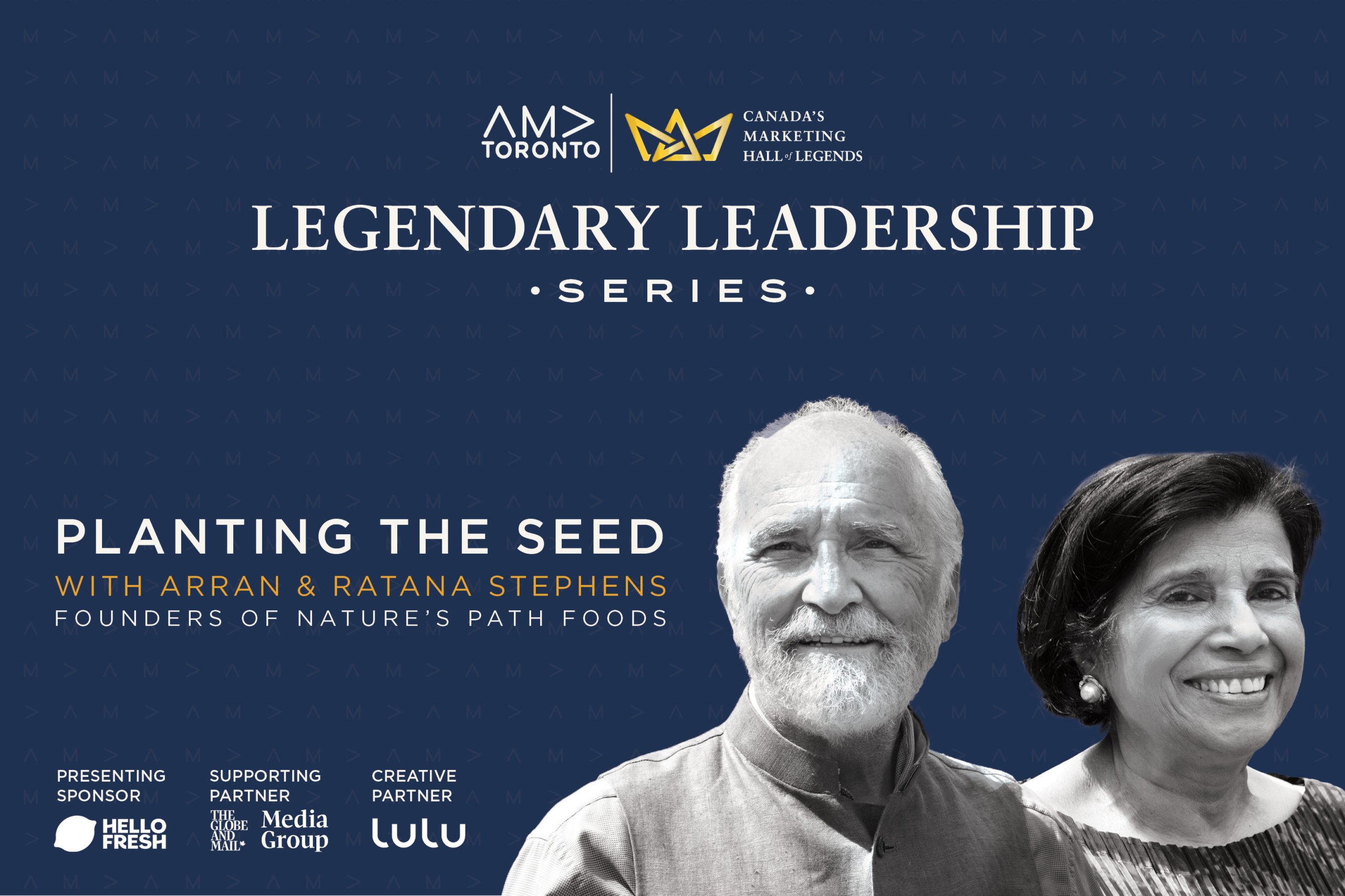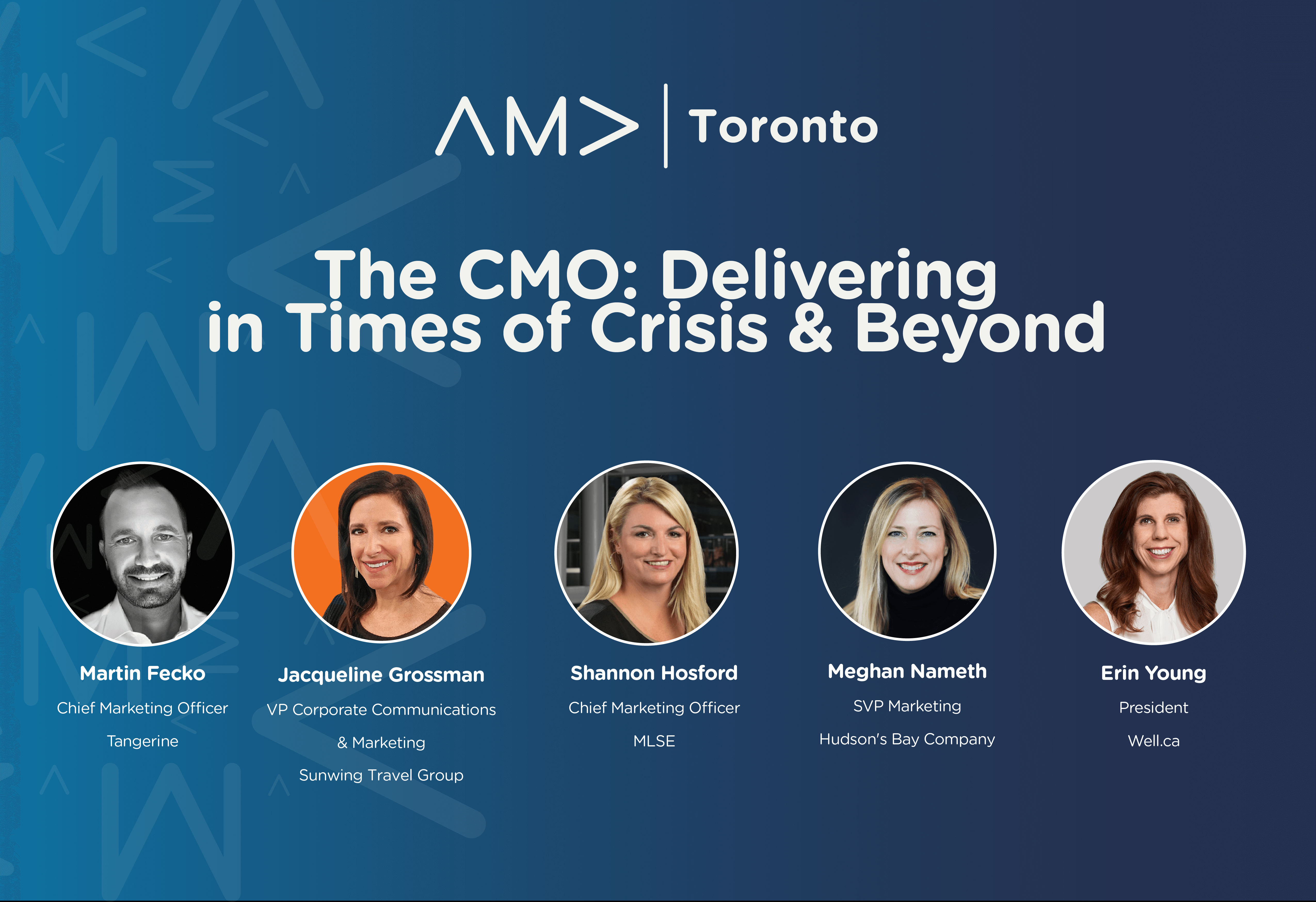AMA Toronto’s brand promise is to empower the leadership potential inside all of us. One of the pillars supporting this promise is an exchange of knowledge in the form of “Leadership Conversations’.
AMA Toronto President Tina Portillo met with Tony Chapman, to discuss his entrepreneurial journey that includes founding, building and selling two agencies, co-founding and selling a research firm, speaking at conferences around the world, and today being the host and creator of a radio show and podcast called Chatter That Matters.
Tony is one of the youngest members to be inducted into the Marketing Hall of Fame, a testament to his thought leadership, and his agencies that have won several best of show and gold awards in both national and international campaigns and Marketing Magazine’s Agency of the Year. Four documentaries including one from the United Kingdom and one from Australia have profiled his approach to brand building.
Tell me about your career journey
‘My career started at age five when I like many that age saw a lemon-aid stand to shake down friendly neighbours for loose change. My mom saw it as an opportunity to teach me to earn money. She rented me the pitcher, sold me the ingredients, and I had to figure out the profit margin. And our front lawn wouldn’t do because it wasn’t sunny and it lacked traffic, so my entire endeavour was dragged down to the local park.
The next definitive moment came when I put myself through university selling radio advertising. It was commission only and I realized that I was happy with the risk of making nothing in exchange for an environment where there was no ceiling. During my entire career, I have only worked for a paycheck for 14 months. The rest of the time the majority of my income has been as an owner and based on the high-wire dance between having it all and losing it all.
At age 26, I partnered with three people to create Communique. We produced sales conferences, annual meetings and incentive trips. Those were the days of the 18 project slide shows and the earliest days of computer-generated graphics. We combined both to create ‘off the shelf’ programs that could easily be customized and rented to clients. In doing so, the client could have a much bigger creative and value bang for their budget, and we could repurpose the creative. I knew little about running an agency but had to learn quickly as we grew to over 100 people.
‘Know the company that you keep’
My frustration, and much that comes with the impatience of youth, was that I felt that I was the dominant player, but only took home a quarter of the rewards. The only way out was an exit strategy, and we learned a valuable lesson about the company that we keep. We sold the agency to a British firm that went bankrupt within a year. We were locked out of a profitable business. We ended up with little other than a powerful lesson in life on knowing the company that you keep.
‘You can’t build a house, from the roof down’
Out of a friend’s art studio, and desperate to generate cash flow to feed my family, I started Capital C. My first employee, who also retained a small equity position, was a CPA. I knew I could drive the top line, but I needed someone to ensure the foundation was strong. Another lesson in life – you can’t build a house from the roof down!
“First mistake I made, I sold it. Was that a mistake? Well, I sold it to the wrong people and within 12 months, they had gone bankrupt and lost everything. It was the greatest lesson I had.”
“The big agencies labelled what we did ‘below-the-line’ …’They did us an immense favour”
Capital C was a blue-collar agency. We were about selling cases. The big agencies did us an immense favour labelling what we did ‘below the line’, to preserve their status as the big campaign creators. This gave us permission to target any client, regardless of their contractual commitments, and we were often welcomed by their agencies who wanted nothing to do with creating a point-of-sale campaign, sweepstakes and contests or displays.
What they would learn, as we walked away with Agency of the Year, and dominated the promo awards in its earliest days, were some of the biggest ideas that could originate without the confines of a 30-second spot. We created Kraft Hockeyville, we had a bride cut off her hair to dramatize a ‘wigging out’ over a bad hair day, and we launched a car without any advertising as social media started to come on strong. We sold a ton of cases.
My ego got the best of me as our business grew alongside my frustration with briefs that were less about insights and more about permission to create big mass media campaigns. That frustration led me to swim upstream to compete for the entire account. We had a tremendous run and won Agency of Record or Digital Agency of Record for some incredible clients, but our competitive set went from other ‘below the line’ shops to the best in the business. That new arena required us to invest in attracting and retaining higher-priced talent, and a culture that could work in harmony with all aspects of the brand.
‘Marketers went from spending money to investing it’
The biggest change and one everyone who is marketing should be aware of, is that fifteen years into running Capital C, in the early 2000s, Marketers went from spending budgets to investing in them. Instead of focusing first on the ‘big idea’ and being swept away with the possibilities, they became more consumed with the cost of the campaign and return on investment. More and more campaigns were being imported into Canada and activated.
I realized that our platform of ‘big ideas that work’ was losing its teeth to clients that wanted to bite off less on risk. In 2012, I sold my remaining interests to MDC without a plan in place on what to do next.
‘Chasing Microphones’
My next reinvention was to find a tightrope that was again risk and reward, but this time without the safety net of partners. I created Tony Chapman Reactions and focused all of my effort on speaking at or hosting entire conferences. I loved the adrenaline of the stage and all the travel that came with it. I delivered talks in China, Poland, Spain, Scotland, the United Kingdom, Brazil, Mexico, and across the United States. I also saw an opportunity to hang around longer.
Most of the conferences I spoke at were organized under a theme, but the agenda lacked consistency or flow. I positioned myself as a strategic host, a third party journalist who could open and close an event to ‘set the table’ and ‘pack away the dishes’ at the end, but also appear on stage throughout the event to ask the questions the audience deserved answers from, or content the presenter wanted to accentuate. My role as the host allowed me to fully immerse myself into the event, and more importantly return each year as their guide.
‘Covid gave me the opportunity of a lifetime’
Covid hit and within 48 hours every upcoming gig I had was cancelled. I had been blessed with a great career and I could take the financial hit and even retire, but that 5-year-old kid wired to sell lemonade was still thirsty for more.
I was also deeply concerned about what this pandemic would present to small business owners, a sector I had always been part of and cared immensely for. I wasn’t the only one. Within three weeks I had convinced a major radio network, and RBC to sponsor an 8-part podcast series where I would personalize the stories of small business owners, so we would take their challenges personally, and then invite three experts to share their advice on how to reframe their business.
I couldn’t pick a better partner in RBC. Their only ask was to make the show about the owner, and not them. This eight-part series is now approaching 70 episodes, and we have expanded the intent and mandate of the show. In each episode, I chat with ordinary people who do extraordinary things, and in doing so their life lessons inspire me, and I hope many others, to do more and to be more. To get to where we need, want and deserve to go. My guests have included other Marketing Hall of Legends, including Arlene Dickinson, Joe Mimran, Jeanne Becker and Joe Jackman, plus Olympians, Musicians, Artists, Social Justice Warriors and people who have overcome almost everything to put a dent in the universe.
‘Chatter That Matters is my true labour of love’
I feel my entire career has led me to this place and I have never been more energized or proud of the work that I am doing. I am not only producing the podcast, but I have expanded my relationship with RBC to include webinars, and I have expanded my content offering to work with other clients, like Deloitte, Farmers Edge and many more who want to put their audience first.
Additionally, my speaking and hosting business has benefited from being virtual and I have invested in unique content more suited for zoom than the stage.
‘Attention is the Oxygen of Marketing’
Attention is the oxygen of marketing, in fact of almost all human endeavour. Your ideas, brands, entrepreneurial ambitions, and career require the attention of others to flourish. How you position why you matter to the people that matter most is key. That is what great content does – it’s not about you or your story, it’s about becoming part of theirs.
What advice do you bring to people you mentor?
There are three kinds of wealth in this world. Intellectual wealth, emotional wealth, and finance. If you chase financial wealth, you’ll never be happy. You’ll never be successful because you’ll never have.”
Tony’s first piece of advice is always to find a place where you’re intellectually stimulated, your learning, you encourage others to share their smarts and their brains. Furthermore, he adds that you be emotionally engaged and vested in a higher purpose than just profit.
What type of leadership do you believe in? YODA
Focus on the outcome of your employee or customer, not your outcome. Everybody’s on a journey in life and that if you’re part of their quest to help them succeed, conquer, fulfill then you will also succeed. Be their Yoda.
What is your talent strategy?
I put myself through university selling radio full time. I don’t have an MBA, and my parents were street smart, not book smart. My talent strategy which has been easy to realize is to surround myself with people much smarter than I am. My role is to inspire, and ideate but the real work is in the amplification of those ideas and the superb execution. So hire smart and get the hell out of their way.
We talked about mentoring. Is this something we need more of?
This year, AMA Toronto launched the book that Alan Middleton wrote for the chapter called “Mentorship Matters.” Asking Tony how mentorship has played a role in his career and whether he has benefited from mentorship or being a mentor himself he shares:
“I think the keyword is benefiting and whether you’re a mentor or a mentee, if you don’t get something out of it, you’re not doing it. Mentorship is an exchange of ideas, not a dumping ground. Both should walk away with their knapsack overflowing as each comes with its own context.
I also think in this climate of great and grave insecurity, where people are more apt to think about impossibility versus possibility, is that a mentor can also share what they went through to battle great economic meltdowns. Taking the “in” out of insecurity and the “im” out of the word impossibility might be the greatest value of all.
Tell us about your experience with AMA Toronto
AMA Toronto is fortunate to have Tony as part of our association for several years beginning with his induction in 2008 as one of Canada’s Marketing Hall Legends (CMHOL). He was also a long time Mentor in the Mentor Exchange program, the master of ceremonies at our first ever virtual CMHOL gala in 2020, and is now involved in launching a new AMA Toronto initiative and video content series this year called “Legends Journey – Lessons in Leadership” – Tony has been an invaluable supporter of AMA Toronto and we asked him about his experience and why he stays involved.
Tony acknowledges that the world is changing and we’re being pushed back on our back feet. He suggests that a lot of what we know is being rendered obsolete; brands that we thought were too big to fail are being Ubered. Tony says the role of “Legends” should be almost like how other societies treat the elders and feels that legends have valuable experiences. He recognizes that legends have gone through tough things like economic recessions, have gone through volatility and still managed to come out the other side.
“If we can help share our stories and if, as a host, if I can help pull some of those stories out, if we can start drawing some of those lessons out and sharing them with the new generation, then that’s a job well done. And more importantly, if the people listen to those lessons and apply to their circumstances then I think that is where magic happens. It’s really almost like the indigenous, the elders, sharing their stories with the next generation. And if I can help do that, then that’s a great way to volunteer my time. Selfishly, I learn a lot because I’m going to get to interview some people that are much smarter and much more accomplished than I will ever be.”
AMA Toronto is a volunteer-run organization with over 90 volunteers helping to contribute to the chapter whether at the Board level, on committees, as Advisory Council members or as Mentors – they are the heart and soul of AMA Toronto; and we thank Tony for continuing to stay involved and for volunteering his time. But most importantly, for sharing his unique leadership knowledge and insights with our AMA Toronto community, helping us empower leadership potential.
Be sure to tune into Tony’s radio show and podcast, Chatter That Matters.




